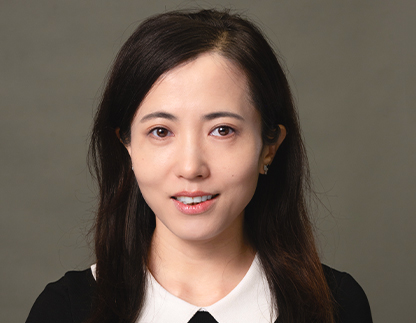Be clear about your passion and your goals. Be humble in listening and learning from others.”
Junqin Bai
Postdoctoral Fellow in the Division of Allergy and Immunology

Junqin Bai is a postdoctoral fellow in the Division of Allergy and Immunology in the Feinberg School of Medicine. She specializes in otolaryngology (ear, nose, and throat issues) with a focus on immunology and micro and molecular biology. In addition to her research at Northwestern, she has also worked at the University of Illinois Chicago as a teaching assistant and a research assistant.
How would you describe your research and/or work to a non-academic audience?
I specialize in immunology, molecular biology, and microbiology, focusing on understanding the complex mechanisms driving chronic rhinosinusitis with nasal polyps (CRSwNP). This widespread health issue significantly impacts general well-being and burdens public health systems. My expertise spans a diverse skill set, ranging from experimental design to proficiency in molecular techniques, flow cytometry and sorting, cell culture, immunofluorescence, single-cell RNA sequencing, proteomics, and statistical and bioinformatics analysis. As a versatile researcher, I employ a multidisciplinary approach to uncover intricate biological and immune processes.
Tell us what inspired your research and/or work.
The inspiration for my research stems from the direct utilization of clinical samples obtained from patients with Chronic Rhinosinusitis (CRS). My work involves employing biostatistical methods to analyze biomarkers, aiming to predict the severity of the disease. This focus on predicting disease severity aligns with the interests of pharmaceutical companies engaged in target development for treatment strategies.
What do you find both rewarding and challenging about your research and/or work?
What I find both rewarding and challenging about my research is the satisfaction derived from advancing our understanding of disease mechanisms. It's particularly rewarding when we make significant progress. However, the process presents challenges, mainly in terms of the time required to achieve substantial findings and the demand for high-quality publications.
What is the biggest potential impact or implication of your work?
The potential impact or implication of my work lies in its applicability as a target for advancing and discovering biologics.
Why Northwestern?
I choose Northwestern because I developed a deep affection for the city of Chicago and because I hoped to remain in the area after completing my PhD at UIC. During that period, I discovered an opportunity to both learn and contribute my knowledge within the realm of immunology.
How do you unwind after a long day?
I work out or attend nearby events.
What books are on your bedside table?
The Bible, books about exploring national parks, anything exploring philosophy.
What inspires you?
The beauty of nature and the complexity of human beings.
How would your closest friends describe you?
Creative, energetic, kind, outgoing, and someone who enjoys exploring nature.
What did you originally want to be when you grew up?
A scientist and a professor.
What advice would you give your younger self or someone considering a similar path?
Be clear about your passion and your goals. Be humble in listening and learning from others.
Tell us about a current achievement or something you're working on that excites you.
Having scientific works published in prestigious journals and showcased at conferences, my current service as a Christian Fellowship president, and actively participating in the Northwestern University Postdoc Association (NUPA) committee — these are achievements that truly excite me.
What is a mistake you have learned from in your career?
I was not clear about my strengths and passions until spending years as a postdoc, particularly in the areas of molecular biology and microbiology, with a specific focus on immunology.
What are you most proud of in your career to date?
Being acknowledged in my field.
Publish Date: December 12, 2023
If you know a graduate student, postdoctoral fellow, graduate faculty member, staff member, or a member of our TGS alumni population who would make a great candidate for our TGS Spotlight Series, please complete this brief TGS Spotlight Series Nomination Form.